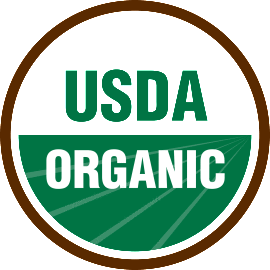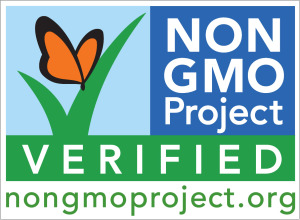
Although many USDA Certified Organic products today also carry the “Non-GMO Project Verified” label, this additional verification is not required by any authority or retail chain, nor necessary to validate that the product does not contain any ingredients derived from GMO crops.
GMOs are an excluded method in organic production and growers, processors and marketers of organic products have already verified the exclusion of GMO in their products through their organic certifying agency.
According to the Organic Trade Association (www.ota.com), “OTA believes that third-party certification under the USDA National Organic Program (NOP) is all that is needed to demonstrate non-GMO production. OTA prefers the use of the USDA Organic seal and “certified organic by….” as the primary and sole messaging on organic products regarding the absence of GMOs, bioengineering, or other excluded methods associated with genetic engineering.” (https://www.ota.com/ota-position-labeling-usda-nop-certified-products-and-“non-gmo”-claims)
In fact, the US FDA has been in agreement with this position since they published their draft guidance on Voluntary Labeling Indicating Whether Foods Have or Have Not Been Developed Using Bioengineering (http://www.fda.gov/Food/GuidanceRegulation/GuidanceDocumentsRegulatoryInformation/ucm059098.htm)
 In this guidance, FDA states: “FDA has been asked about the ability of organic foods to bear label statements to the effect that the food (or its ingredients) was not produced using biotechnology. On December 21, 2000, the Agriculture Marketing Service o the U.S. Department of Agriculture (USDA) published final regulations on procedures for organic food production (National Organic Program final rule; 65 FR 80548). That final rule requires that all but the smallest organic operations be certified by a USDA accredited agent and lays out the requirements for organic food production. Among those requirements is that products or ingredients identified as organic must not be produced using biotechnology methods. The national organic standards would provide for adequate segregation of the food throughout distribution to assure that non-organic foods do not become mixed with organic foods. The agency believes that the practices and record keeping that substantiate the “certified organic” statement would be sufficient to substantiate a claim that a food was not produced using bioengineering.
In this guidance, FDA states: “FDA has been asked about the ability of organic foods to bear label statements to the effect that the food (or its ingredients) was not produced using biotechnology. On December 21, 2000, the Agriculture Marketing Service o the U.S. Department of Agriculture (USDA) published final regulations on procedures for organic food production (National Organic Program final rule; 65 FR 80548). That final rule requires that all but the smallest organic operations be certified by a USDA accredited agent and lays out the requirements for organic food production. Among those requirements is that products or ingredients identified as organic must not be produced using biotechnology methods. The national organic standards would provide for adequate segregation of the food throughout distribution to assure that non-organic foods do not become mixed with organic foods. The agency believes that the practices and record keeping that substantiate the “certified organic” statement would be sufficient to substantiate a claim that a food was not produced using bioengineering.
In essence, food processors or marketers who have chosen to go through the additional expense and time required to be certified by the Non-GMO Project and use their label, are not only spending money needlessly, but they are also creating doubt about the value and safety of Certified Organic foods. What consumers do not realize is that non-organic products that carry the Non-GMO Project label are produced from conventional agriculture that heavily relies upon chemical inputs such as toxic pesticides and herbicides, including Monsanto’s RoundUp.
